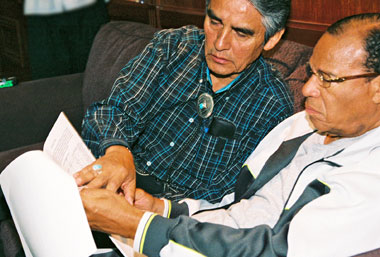
WINDOW ROCK, Arizona (FinalCall.com) – Arriving with great anticipation on the sacred ground of the Navajo Nation, the Honorable Minister Louis Farrakhan and a delegation from the Nation of Islam was received with brotherly love.
Upon the invitation of Navajo President Joe Shirley, as a follow-up to a four-hour meeting between the leaders at Minister Farrakhan’s home in Phoenix, Ariz., the delegation came to look, listen and learn about the way of life and present struggles of the Navajo. We came with questions and left with a greater understanding.
At the side of Minister Farrakhan was Nation of Islam First Lady Mother Khadijah Farrakhan, accompanied by their daughter Maria Farrakhan and Mother Tynnetta Muhammad, wife of the Honorable Elijah Muhammad. Minister Farrakhan was also joined by Chief-of-Staff Leonard F. Muhammad, International Representative Akbar Muhammad, Nation of Islam Minister of Agriculture Dr. Ridgley Muhammad, Phoenix Muhammad’s Mosque No. 32’s Minister Patrick Muhammad, Muhammad University of Islam teacher Shahid Muhammad and director of the Millions More Movement Indigenous Nations Alliance Yo’NasDa Lonewolf-McCall Muhammad, who coordinated the initial meeting between the two leaders from her desire to link the Black and Red nations.
On July 17, the delegation was welcomed by a dinner that was highlighted by storytelling by Miss Navajo Nation Rachelle James. The 21-year-old astounded the delegation, not only with her bubbling charisma, but when she informed them that she grew up without electricity or water until two years ago. The next day began with a private morning meeting with Pres. Shirley in his office with several of his aides, who outlined and explained the priority issues of public safety, education, social services, environmental protection and economic survival and progress, as well as shared the history, sacred practices, moral spectrum and daily structure of the Navajo way of life and demographics and statistics of the communities.
Later that evening, Pres. Shirley hosted an extended conversation with eight delegates of the Navajo Nation Council with the Nation of Islam delegation to discuss economic, political and social issues. On the last day, Minister Farrakhan addressed the Navajo Nation Council during its morning session inside its colorful chambers adorned with murals illustrating the history of the Navajo.
Discussions, whether during a dignitary dinner or private meetings, centered around the Navajo people’s struggle to create decent living conditions for themselves in the face of budgetary cuts in the federal funding of the tribe. Economic development, though essential for advancement, was not the immediate goal; it was basic survival within a disintegrating and sometimes absent infrastructure.
“We have a so-called super-country, with money that it gives away and uses it to make war like what is going on right now. But in its midst, right there in its backyard, there are people starving, people living in what they call Third World living conditions: no power, no water, no waste water disposal system, no means of communication, and one of those is us Navajo. The living conditions in some places are atrocious in the country,” Pres. Shirley observed, expressing deep frustration to see the Navajo Nation moved beyond the desperate lines of poverty. “I have people hungry, as we talk. I have people hurting, as we talk. We try to tell them that we have elderly hurting, young who are parentless hurting. I have grandmothers living in shacks in darkness. It’s not only the Navajo Nation suffering. Some of the other Indigenous nations here in the Americas, I know are suffering.”
This is the first article in a series that will highlight the humanitarian crisis of the Navajo Nation.












